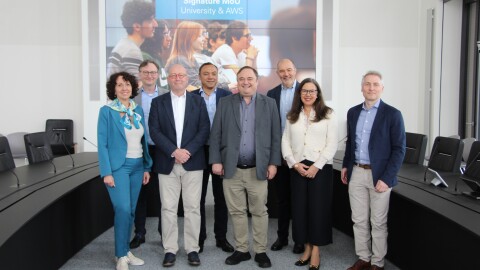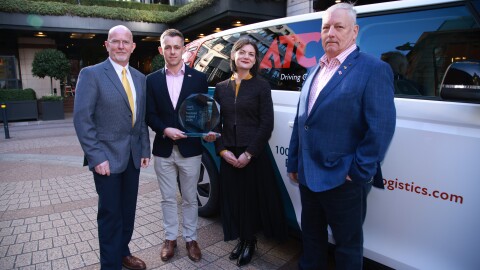Amazon Web Services (AWS) today announced plans to invest an additional €8.8 billion into its existing cloud infrastructure in the AWS European (Frankfurt) Region to meet growing customer demand for cloud services in Germany. According to the new AWS Economic Impact Study (EIS) for Germany, released today, this planned investment is estimated to support 15,200 full-time equivalent (FTE) jobs in local German businesses annually. Having invested €9.6 billion in Germany from 2014 to 2023, AWS contributed an estimated €18.4 billion to Germany’s gross domestic product (GDP), while supporting over 5,900 annual jobs over that ten-year period. Today's €8.8 billion planned investment announcement is estimated to add €15.4 billion to Germany’s GDP and support over 15,200 jobs annually from 2024-2026.
AWS also announced last month plans to invest €7.8 billion from 2024-2040 in the AWS European Sovereign Cloud. The first AWS European Sovereign Cloud will launch in Brandenburg in Germany by the end of 2025, and is estimated to contribute €17.2 billion to Germany’s economic output while supporting an annual average of 2,800 jobs from 2024 to 2040.
AWS’s footprint in Germany
Tens of thousands of active customers use the AWS Region in Germany, which was opened with two Availability Zones in 2014, to digitally transform their businesses. In 2017, a third Availability Zone was added to the Europe (Frankfurt) Region, and this has expanded to a total of 39 Edge locations, three WaveLength Zones in Berlin, Dortmund, and Munich, and one Regional Edge Cache in Frankfurt. In October, AWS launched its first AWS Local Zone in Hamburg, providing AWS’s German customers with even lower latency for their applications.
AWS has corporate offices in Berlin, Düsseldorf, Frankfurt, Hamburg, Munich, and Walldorf. These offices are home to experts like sales representatives, marketing teams, and business development professionals. AWS Development Centers are based in Aachen, Berlin, Dresden, and Tübingen, and these contribute to the backbone of AWS Cloud development, including Artificial Intelligence (AI) and Machine Learning services such as Amazon SageMaker and Amazon Bedrock.
Empowering Germany's cloud workforce

AWS is investing in workforce training programmes to provide accessible cloud learning and upskill the next generation of tech workers in Germany. Initiatives include an apprenticeship programme in Frankfurt in collaboration with Siemens AG, the country’s first national cloud computing certification in collaboration with the German Chamber of Commerce, AWS re/Start, AWS Educate, AWS Academy, AWS Skills to Jobs Tech Alliance, and AWS GetIT.
AWS InCommunities: local impact through global commitment

Through AWS InCommunities, AWS launches longer-term initiatives focused on education, skills development, sustainability, and addressing local needs. In the Rhein-Main Region employee volunteers have dedicated nearly 800 hours in 2023 to hyperlocal projects, like the renovation of a childrens’ playground in Frankfurt. AWS also established the Frankfurt Fund to provide up to €100,000 in grants to local non-profits, schools, and community groups.
More sustainable cloud operations for a greener future

Amazon is committed to becoming net-zero carbon across its operations by 2040, 10 years ahead of the Paris Agreement, as part of The Climate Pledge, and Amazon is on path to match all of its global electricity use with 100% renewable energy by 2025, five years ahead of our initial 2030 target goal.
In Europe, Amazon has invested €2.4 billion in renewable energy projects and enabled more than 180 wind and solar projects across 13 countries. Once operational, they are expected to provide 6.7 gigawatts of energy capacity, enough to power over 5.7 million German households annually.
Amazon is the largest corporate purchaser of renewable energy globally. Among the renewable energy projects enabled by Amazon in Germany are Orsted’s offshore wind farm Borkum Riffgrund 3, projected to provide 350 MW of capacity when operational in 2025, as well as Iberdrola’s Baltic Eagle and Windanker offshore wind farms, expected to provide Amazon 320 MW of energy each year when completed.
AWS is committed to minimising its environmental impact through energy efficiency measures like custom Graviton4 and Trainium chips that reduce energy usage versus on-premises data centers. In addition, AWS will be water positive by 2030, returning more water to communities than it uses in its direct operations. AWS provides tools like the AWS Well-Architected Sustainability Pillar, AWS Customer Carbon Footprint Tool, and Amazon Sustainability Data Initiative to help customers improve their cloud architectures, measure emissions, forecast future impacts, and accelerate sustainability research and innovation.

















